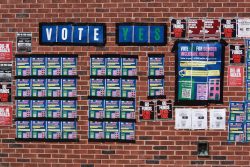Two sides are bitterly divided over an historic claim to a homeland. Both allege the other is infringing upon their basic rights, and while there has been scattered dialogue between the two groups, lasting change has never been realized. No, this is not the Gaza strip. This is the Georgetown neighborhood.
Both students and neighbors claim grievances that stem from the University’s close proximity to local residents—from constant noise and alcohol-related incidents to a recent neighbor-led initiative to halt the expansion of Lauinger Library as part of the University’s upcoming ten-year plan. Neighbors who have lived their entire lives in Georgetown claim the overlapping regions should default to a quieter, residential feel. Georgetown students are quick to point out that it was the University, not the surrounding neighborhood, that first occupied this area of D.C. A little noise, after all, is part of what defines a college experience.
Regardless of who can stake an original claim on Georgetown, both neighbors and students are here to stay. Only by creating new paths for dialogue can Georgetown’s administration begin to reconcile the differences between its students and its unhappy neighbors. The burden to initiate dialogue falls on both the neighborhood councils and Hoyas alike, and it places the University in a position to advocate for the rights of its students.
It is not enough for the University to simply moderate between students and neighbors; it should actively pursue its students’ best interests—even if doing so comes into conflict with the wishes of neighbors. Furthermore, the administration should use its weight to lend gravitas to the initiatives of its students, who are often seen by neighbor associations as transient (and therefore unreliable) members of the community.
One way the administration can show its support is by getting more students involved in the discussion. First, Georgetown should pressure the Alliance for Local Living to have more open meetings with students, and should ultimately host its own on-campus forums between students and neighbors. When the most meaningful encounter between neighbors and many Georgetown students consists of a shouting match at 3 a.m. outside Philly Pizza, the community is suffering from a breakdown of communication. Georgetown must allow a broader range of students to contribute to the discussion by establishing more open lines of dialogue close to campus. It is through this type of dialogue that Georgetown can lend credence to the point of view of its students, putting them on equal footing with the neighbors and giving them the push necessary to defend their rights as Georgetown residents.




